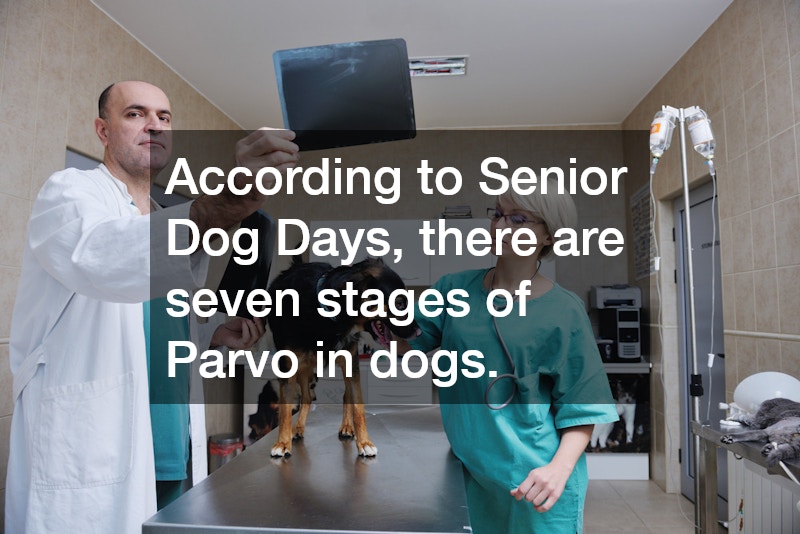

If you’re a dog owner, you appreciate the love and companionship your dog will give you. Finding an animal hospital in your area is an important element in caring for your dog. As you bring your dog for its annual wellness visit, your pet’s vet will be able to detect signs and symptoms of common health conditions in dogs.
One common condition for puppies is the parvovirus. According to Canine Journal, Parvo is a contagious virus that can attack the cardiac or intestinal muscles of puppies between six weeks and six months old. This canine ailment is more commonly found in the intestines; the cardiac form is often fatal. Although the parvovirus doesn’t cause worms, according to Pet Coach, your puppy may have Parvo and worms at the same time.
According to Senior Dog Days, there are seven stages of Parvo in dogs. The most critical stage of Parvo is the fourth stage when your pet will have sufficient symptoms to be diagnosed. When your dog comes to our office, the vet will perform a canine Parvo test. These tests are typically performed by using a rectal swab or examining the dog’s feces.

Taking care of your animal is not unlike taking care of your own health. It’s being proactive and always looking for the warning signs, even if they seem pretty mild to start with.
When your dog starts to show signs of weight loss or you’re worried you could have a flea infestation on your hands, a vet can help out. In these expensive times the DIY route often seems more preferable. Constantly putting your dog’s health in the hands of conjecture, though, can be a recipe for disaster. Your veterinarian has all the tools you need to keep your pet healthy, providing peace-of-mind with tested resources and scientific knowledge. Thinking of updating your dog’s health plan this year?
Read below to learn about the basics of good pet care and how you can make sure you’re never leaving your furry friend’s health up to chance.
Make Sure Your Puppy Is Vaccinated
Your cute puppy may be full of life and energy, but they’re far from invincible. Now is the time to give them the preventative care they need to live a healthy adult life. Expect to spend anywhere between $2,000 and $5,000 on your puppy during their first year (which can be a little lower or higher depending on their health). Vaccinations are essential to keep them protected against common parasites and viruses. It’s estimated there are over 25,000 small animal veterinary clinics in the United States, so you’ll never be wanting for convenient locations.
Get Comfortable With Brushing Your Dog’s Teeth
It’s not just your own oral health to worry about. Your dog is just as susceptible to plaque as you are! While most veterinarians today recommend owners brush their dog’s teeth daily, this remains one of the more uncommon pet maintenance habits. Since there are large gaps in-between canine teeth you don’t need to floss. A simple brush massaging the gums and loosening up stuck food will go a long way in keeping your pet as healthy as possible.
Remove Ticks As Soon As Possible
With warmer weather coming around there’s good reason to be wary of pests. Ticks aren’t just frustrating invaders, they have the ability to spread dangerous illnesses like Lyme disease. Signs of tick-borne disease might not appear for one to three weeks after your dog has been bitten, too. Make sure to check your dog thoroughly after taking them out on a walk, especially if you live in a forested area. Any ticks should be removed with the aid of a vet (who can keep it for future medical reference should complications arise).
Weight Loss Is An Issue That Should Be Taken Seriously
Does your dog seem to be losing weight? While this can be a minor change — particularly with diet changes or increased exercise — it can also be cause for concern. Depending on the breed, age, and health your dog should get anywhere between 30 minutes to two hours of exercise daily. Weight loss that continues without probable cause could be signs of heartworm or a diet that isn’t taking. Your Sykesville vet clinic will provide you the help needed to bring your dog back up to speed.
Yearly Trips To The Vet Will Give You Peace-Of-Mind
From learning how to care for a dog wound to checking early dog pregnancy symptoms, your vet will have the answers you need. It’s recommended you bring your dog to the vet at least once per year for an annual check-up. This is done to intercept any health issues that could be cropping up with you none the wiser, alongside general wellness and dietary tips. If you haven’t spayed or neutered your dog? It’s best to get that done as soon as possible so you can save yourself the trouble of finding a home for a surprise litter.
We all need a little help to feel our best. Give your dog some relief from old dog skin problems or heartworm with the aid of your friendly local vet.
Share This :